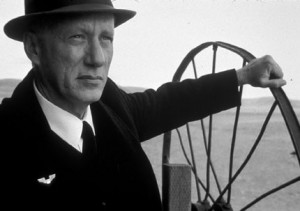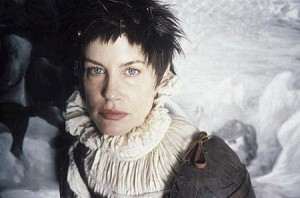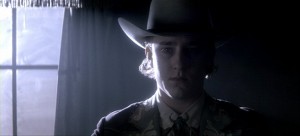Northfork
 Stunningly shot. Every single image is astonishing. Think the black and white imagery of Seven (which may be in color, but clearly was intended to look like drained color), with a stronger emphasis on dark blue and grey. But much like the movie it is trying to evoke, Days of Heaven, the story is unfocused and goes nowhere. At first it seems a poetic evocation of a period, in 1955, a town is about to be covered in water so as to provide new forms of electricity, and so the residents must be evacuated. Three teams of two men are sent in to convince the townsfolk who haven’t already left to leave; the incentive for the men is to receive beachfront property. For about 25 minutes, this is a great film. We see all the effects it will have on the town; a couple leaves their adopted child with the priest they initially took him from because they believe him too sick to make the journey. Pathos is everywhere, the church where the remaining members of the town (there are only two days left before the water arrives) has no back to it, and as Nick Nolte, playing the priest, preaches, he stands at the podium and there is nothing but the mountains behind him, as the church no longer has a back to it.
Stunningly shot. Every single image is astonishing. Think the black and white imagery of Seven (which may be in color, but clearly was intended to look like drained color), with a stronger emphasis on dark blue and grey. But much like the movie it is trying to evoke, Days of Heaven, the story is unfocused and goes nowhere. At first it seems a poetic evocation of a period, in 1955, a town is about to be covered in water so as to provide new forms of electricity, and so the residents must be evacuated. Three teams of two men are sent in to convince the townsfolk who haven’t already left to leave; the incentive for the men is to receive beachfront property. For about 25 minutes, this is a great film. We see all the effects it will have on the town; a couple leaves their adopted child with the priest they initially took him from because they believe him too sick to make the journey. Pathos is everywhere, the church where the remaining members of the town (there are only two days left before the water arrives) has no back to it, and as Nick Nolte, playing the priest, preaches, he stands at the podium and there is nothing but the mountains behind him, as the church no longer has a back to it.
 And then someone forgot their medication. The sick child imagines he is in a graveyard (where the caskets are being dug out to be moved as well) and he runs into some sort of celestial being played by Daryl Hannah. She takes him back to where she is hiding out, where she is joined by Anthony Edwards, wearing a Terry Gilliam device on his face, playing a character named Happy, another character, a skeptical figure named Cup of Tea (or at least that’s what he introduces himself as), as well as God, who does not speak and only writes in scribble, which is then interpreted by Edwards. This subplot takes over the movie, as the unintelligible little boy tries to convince them to take him with them, wherever that may be. At this point the movie has become a slapstick vaudeville comedy; I’m surprised I didn’t see anyone in blackface break into a little dance.
And then someone forgot their medication. The sick child imagines he is in a graveyard (where the caskets are being dug out to be moved as well) and he runs into some sort of celestial being played by Daryl Hannah. She takes him back to where she is hiding out, where she is joined by Anthony Edwards, wearing a Terry Gilliam device on his face, playing a character named Happy, another character, a skeptical figure named Cup of Tea (or at least that’s what he introduces himself as), as well as God, who does not speak and only writes in scribble, which is then interpreted by Edwards. This subplot takes over the movie, as the unintelligible little boy tries to convince them to take him with them, wherever that may be. At this point the movie has become a slapstick vaudeville comedy; I’m surprised I didn’t see anyone in blackface break into a little dance.
Irrelevant angel subplots that you tie into your movie are never a good idea. See Danny Boyle’s A Life Less Ordinary for an even better example of why you don’t do this. Angels do not add whimsy. They are childish notions usually thrown in out of desperation. Angels have been effective in exactly two movies that I can recall. Wim Wenders‘ Wings of Desire, and its sequel Faraway, So Close. Why do they work in these films and no others? Because Wenders took the angel-human relationship seriously, and didn’t treat them as either comic relief or as some sort of otherworldly spiritual notion, he sensed how closely related they were to humans, and how they longed for some elements of their previous lives and how they might be worth reliving, but did not cheapen their meaning as angels overall.
Then the previously somber tone of the rest of the film takes on the slapschtick, with, I shit you not, references to Diff’rent Strokes and Touched by an Angel. Here we have these serious actors, in dark suits and fedora hats, James Woods (who co-produced?), Peter Coyote, Jon Gries, and many other “that guy” actors, although co-writer/producer Mark Polish is seriously out of his depth, but here they all are making jokey references to television shows that haven’t even been shown yet.
And then there will be another shift, this time, trying to evoke tears, but the movie has worn out its welcome by this point, and just seems forced and maudlin.
 This is all fairly typical of brother writer/directors Mark and Michael Polish, their other two films are like this in terms of missed opportunities. Both Twin Falls, Idaho and Jackpot are stunning visually, and they are wonderfully moody, but have no story worth following at all, in the case of Twin Falls, no story period. Someone, at some point needed to intervene and suggest they hone in their vision, to tell in one story, instead of parts of three. The way the movie plays now, it’s as if somehow after their infusion of Terrence Malick, they felt like throwing in O’ Brother Where Art Thou? (including people sitting on drowned houses) for good measure. I rented this movie, but don’t see much of a reason to buy it, save for playing it without sound, looking up occasionally, just to savor the visuals.
This is all fairly typical of brother writer/directors Mark and Michael Polish, their other two films are like this in terms of missed opportunities. Both Twin Falls, Idaho and Jackpot are stunning visually, and they are wonderfully moody, but have no story worth following at all, in the case of Twin Falls, no story period. Someone, at some point needed to intervene and suggest they hone in their vision, to tell in one story, instead of parts of three. The way the movie plays now, it’s as if somehow after their infusion of Terrence Malick, they felt like throwing in O’ Brother Where Art Thou? (including people sitting on drowned houses) for good measure. I rented this movie, but don’t see much of a reason to buy it, save for playing it without sound, looking up occasionally, just to savor the visuals.



